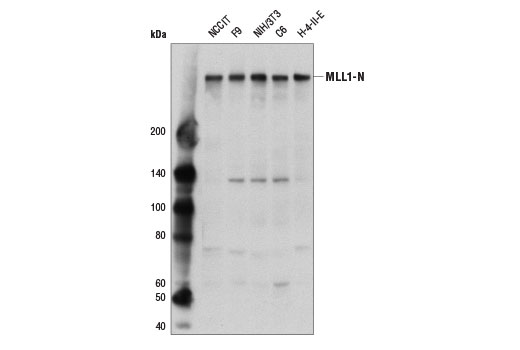

品牌: CST
 下载产品说明书
下载产品说明书 下载SDS
下载SDS 用小程序,查商品更便捷
用小程序,查商品更便捷



 收藏
收藏
 对比
对比 咨询
咨询分子量:
300
300
反应种属:
Human,Mouse,Rat,Monkey,
Human,Mouse,Rat,Monkey,
产品介绍
产品信息
抗原名称
MLL1

来源纯化
Monoclonal antibody is produced by immunizing animals with recombinant protein specific to the amino terminus of human MLL1 protein.

宿主
Rabbit

简单描述
Monoclonal Antibody for studying MLL. Cited in 18 publications. Validated for WB, IP, C&R, C&T. Highly specific and rigorously validated in-house, MLL1 (D2M7U) Rabbit Monoclonal Antibody (Amino-terminal Antigen) (CST #14689) is ready to ship.

商品描述
Product Usage Information
The CUT&RUN dilution was determined using CUT&RUN Assay Kit #86652. The CUT&Tag dilution was determined using 100,000 cells in a total reaction volume of 100 μl.
| Application | Dilution |
|---|---|
| Western Blotting | 1:1000 |
| Immunoprecipitation | 1:50 |
| CUT&RUN | 1:50 |
| CUT&Tag | 1:50 |

分子量
300

研究领域
癌症,发育生物学与干细胞研究,表观遗传学,神经科学,

应用
反应种属
Human,Mouse,Rat,Monkey,

目标/特异性
Specificity/Sensitivity
MLL1 (D2M7U) Rabbit mAb (Amino-terminal Antigen) recognizes endogenous levels of total MLL1 protein.
Species Reactivity:
Human, Mouse, Rat, Monkey

敏感性
Endogenous

背景
背景
The Set1 histone methyltransferase protein was first identified in yeast as part of the Set1/COMPASS histone methyltransferase complex, which methylates histone H3 at Lys4 and functions as a transcriptional co-activator (1). While yeast contain only one known Set1 protein, mammals contain six Set1-related proteins: SET1A, SET1B, MLL1, MLL2, MLL3, and MLL4, all of which assemble into COMPASS-like complexes and methylate histone H3 at Lys4 (2,3). These Set1-related proteins are each found in distinct protein complexes, all of which share the common subunits WDR5, RBBP5, ASH2L, CXXC1, and DPY30, which are required for proper complex assembly and modulation of histone methyltransferase activity (2-6). MLL1 and MLL2 complexes contain the additional protein subunit, menin (6).MLL1 functions as a master regulator of both embryogenesis and hematopoiesis, and is required for proper expression of Hox genes (7,8). MLL1 is a large, approximately 4000 amino acid, protein that is cleaved by the taspase 1 threonine endopeptidase to form N-terminal (MLL1-N) and C-terminal MLL1 (MLL1-C) fragments, both of which are subunits of the functional MLL1/COMPASS complex (9,10). MLL1-N, MLL1-C, WDR5, RBBP5, and ASH2L define the core catalytic component of the MLL1/COMPASS complex, which is recruited to target genes and methylates histone H3 lysine 4 to regulate transcriptional initiation (11). At least 60 different MLL1 translocation partners have been molecularly characterized and associated with various hematological malignancies. The most common translocation partners include AF4, AF9, ENL, AF10, ELL, and AF6 (8,12,13). With the exception of AF6, all of these partners are nuclear proteins that function to positively regulate transcriptional elongation. AF4, AF9, and ENL are all components of the super elongation complex (SEC), while AF4, AF9, AF10, and ENL all interact with the histone H3 lysine 79 methyltransferase DOT1L. Many MLL1 target genes are normally regulated by promoter-proximal pausing, with the release of RNA polymerase and transcriptional elongation occurring in response to proper stimuli (14). The association of MLL1 translocation partners with SEC and DOT1L suggest that MLL1-fusion proteins may function to sustain specific gene expression programs by constitutively activating transcriptional elongation.
1.Miller, T. et al. (2001) Proc Natl Acad Sci U S A 98, 12902-7.
2.Shilatifard, A. (2008) Curr Opin Cell Biol 20, 341-8.
3.Tenney, K. and Shilatifard, A. (2005) J Cell Biochem 95, 429-36.
4.Lee, J.H. and Skalnik, D.G. (2005) J Biol Chem 280, 41725-31.
5.Lee, J.H. et al. (2007) J Biol Chem 282, 13419-28.
6.Hughes, C.M. et al. (2004) Mol Cell 13, 587-97.
7.Eissenberg, J.C. and Shilatifard, A. (2010) Dev Biol 339, 240-9.
8.Smith, E. et al. (2011) Genes Dev 25, 661-72.
9.Takeda, S. et al. (2006) Genes Dev 20, 2397-409.
10.Yokoyama, A. et al. (2002) Blood 100, 3710-8.
11.Dou, Y. et al. (2006) Nat Struct Mol Biol 13, 713-9.
12.Yip, B.H. and So, C.W. (2013) Exp Biol Med (Maywood) 238, 315-23.
13.Neff, T. and Armstrong, S.A. (2013) Blood 121, 4847-53.
14.Wang, P. et al. (2009) Mol Cell Biol 29, 6074-85.

研究领域
癌症,发育生物学与干细胞研究,表观遗传学,神经科学,
翻译后修饰
Unmodified

制备和贮存
保存方式
Supplied in 10 mM sodium HEPES (pH 7.5), 150 mM NaCl, 100 µg/ml BSA, 50% glycerol and less than 0.02% sodium azide. Store at –20°C. Do not aliquot the antibody.
数据库链接
Entrez-Gene ID
4297

UniProt ID
Q03164

参考图片
Western blot analysis of extracts from various cell lines using MLL1 (D2M7U) Rabbit mAb (Amino-terminal Antigen).
声明 :本官网所有报价均为常温或者蓝冰运输价格,如有产品需要干冰运输,需另外加收干冰运输费。







 危险品化学品经营许可证(不带存储) 许可证编号:沪(杨)应急管危经许[2022]202944(QY)
危险品化学品经营许可证(不带存储) 许可证编号:沪(杨)应急管危经许[2022]202944(QY)  营业执照(三证合一)
营业执照(三证合一)